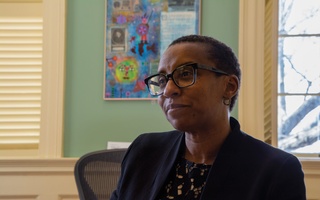{shortcode-367d815d5f2cebbc01210b3e02794b406be20735}
More than 50 Harvard students gathered outside the Charles Hotel Friday afternoon to demand the University create a formalized ethnic studies program.
The Harvard Ethnic Studies Coalition, which comprises affiliates across the University, organized the event, dubbed “The 47-Year Fight: Student Rally for Ethnic Studies.” Students specifically chose to congregate at noon to attract the attention of alumni and administrators — including University President Lawrence S. Bacow — attending the Alumni Leadership Conference luncheon which took place in the Charles Hotel at the same time.
Jeannie Park ’83, a Coalition member and president of the Harvard Asian American Alumni Alliance, said she hoped that holding the event at the same time as the alumni conference would encourage alumni to help publicize the need for a formalized ethnic studies program.
“When I tell other alumni who aren’t paying as close attention, people are honestly stunned. 'Really? There’s no ethnic studies at Harvard?' It kind of blows their mind,” Park said. “It’s so important for the administration to hear from all constituencies, not just students, not just alumni, not just faculty.”
Prior to his speech at the conference and the start of the rally, Bacow paused outside the Charles Hotel to converse with students.
James L. Walkingstick ’21 opened the rally with a prayer in his traditional language of Cherokee to bless the cause.
Several students read passages from University and Crimson archives, including letters penned by activists dating back to 1985. They also read past Crimson articles about historical developments in the fight for a formalized ethnic studies program.
{shortcode-4691ddedf56350852f536b7611834efa25cdf971}
Speakers also shared personal stories about grappling with their ethnic identities and the mentorship they have received from Harvard faculty members who teach ethnic studies courses.
Sally Chen ’19 spoke about her thesis advisor, Assistant History Professor Genevieve A. Clutario, praising Clutario’s course HIST 1013: “Introduction to Asian American History” specifically.
“Asian-American Studies was like taking a breath for the first time,” Chen said.
Clutario, who researches Asian-American history from a transnational perspective, recently accepted a position at Wellesley College. Her impending departure, along with the University’s decision not to put Associate Professor of Education Natasha K. Warikoo up for tenure, attracted sharp criticism last week.
The Harvard Ethnic Studies Coalition, the Harvard Asian American Alumni Alliance, and the Coalition For A Diverse Harvard each penned letters to Bacow denouncing the imminent loss of Clutario and Warikoo, who constituted two of three Harvard professors who study Asian-American studies.
Rally participants pointed out that many of Harvard’s peer universities — including Stanford University and Yale University — have already established their own ethnic studies programs.
Harvard currently offers an Ethnicity, Migration, Rights secondary and an Ethnic Studies field of study within the History and Literature concentration. Faculty of Arts and Sciences Dean Claudine Gay said in an October interview that FAS is conducting searches for faculty specializing in ethnic studies and that she plans to meet with advocates this semester.
Chen said at the rally that Harvard must demonstrate its commitment to diverse curricula now, especially as the University faces a lawsuit alleging discrimination against Asian-American applicants to the College.
“It’s imperative that we defend diversity in admissions, but it’s not enough to worry about who the school admits,” said Chen, who was one of several students to testify in court on behalf of Harvard in October. “We have to ensure also that students are supported and well-equipped to thrive when they arrive on campus.”
Several rally attendees said the push for a formalized ethnic studies program had deep personal importance to them.
“Having ethnic studies symbolizes that our histories are important. They are valid, and they are worth learning,” Tajrean Rahman ’20 said in an interview.
“I feel that if our history, if it’s not learned by everybody, then who are we?” Walkingstick said in an interview. “It’s been erased for the past 400 years for Native Americans, and it’s going to continue to be underrepresented if Harvard’s not doing its part.”
As students chanted “Out of the Courtroom! Into the Class!” outside of the hotel, several alumni joined the group to show their support or just to listen.
“I’ve had deep ties to the university since I’ve been an undergrad — over 30 years. I remember even back then that this was an issue,” Douglas H. Chin ’88 said. “It surprises me that although we’ve made progress, we still don’t have an ethnic studies department.”
—Staff writer Amanda Y. Su can be reached at amanda.su@thecrimson.com. Follow her on Twitter @amandaysu.
Read more in News
Hasty Pudding Honors Milo Ventimiglia as Man of the YearRecommended Articles
-
Green Says Ethnic Studies Don't Fit CoreAlthough ethnic studies has a place in a Harvard education, it does not belong in the Core curriculum, Provost Jerry
-
 Student and Alumni Groups Advocate for FAS Dean Who Will Prioritize Ethnic Studies
Student and Alumni Groups Advocate for FAS Dean Who Will Prioritize Ethnic Studies -
 New FAS Dean Gay Recruiting Faculty Who Study Race, Ethnicity
New FAS Dean Gay Recruiting Faculty Who Study Race, Ethnicity -
 Students and Alumni Call For Ethnic Studies Department in Wake of Professors’ Departures
Students and Alumni Call For Ethnic Studies Department in Wake of Professors’ Departures -
 Harvard Administrators Respond to Call for Ethnic Studies Program, Recruit Three Professors
Harvard Administrators Respond to Call for Ethnic Studies Program, Recruit Three Professors













